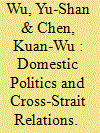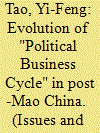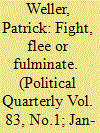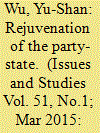| Srl | Item |
| 1 |
ID:
178469


|
|
|
|
|
| Summary/Abstract |
Uzbekistan and Kazakhstan have new leaders for the first time since 1989: Shavkat Mirziyoyev as Uzbek president and Kassym-Jomart Tokayev as Kazakh president. This article uses a theoretical framework based on the literatures of leadership change and political succession while overlaying this literature with the type of economic policies followed by each former leader to analyse the political and economic transitions in these countries. Mirziyoyev has legitimized his authority, even though he was not part of the elite, through reforms designed to help the people (as Karimov had envisioned in the ‘Uzbek way’). In contrast, Nazarbayev’s policies were centred around the state as a facilitator of economic development, a problem for citizens in an economic downturn. While Tokayev transitioned through a formal electoral process, his was a ‘managed’ designation, with the charismatic leader still in a formal position of power, leaving Tokayev without a separate base of legitimacy.
|
|
|
|
|
|
|
|
|
|
|
|
|
|
|
|
| 2 |
ID:
173978


|
|
|
|
|
| Summary/Abstract |
This study examines the association between political competition (elections in Taiwan and political successions in China) and cross-Strait conflicts. We find that the Taiwan president has been more assertive toward mainland China during the election period or in his second term, than during the inter-electoral period or in the first term. The general secretary of the Chinese Communist Party (CCP) reacts to Taiwan’s provocations more harshly when he was in a period of power transition than when he had consolidated power. The two phenomena rest on the same assumption: when a political leader is domestically challenged, he cannot appear weak in external behaviors; when the leader is secure in his position, he can afford to make external concessions. We test the assumption against the empirical evidence from the cross-Strait relations of 1989–2012 and find the most serious conflicts occurred during Taiwan’s electoral period and when the CCP general secretary was in power transition. The study advances our understanding of how conflicts occur in cross-Strait relations and may lead to possible ways of their prevention.
|
|
|
|
|
|
|
|
|
|
|
|
|
|
|
|
| 3 |
ID:
072150


|
|
|
| 4 |
ID:
111666


|
|
|
|
|
| Publication |
2012.
|
| Summary/Abstract |
Prime ministers often have to work with prime ministerial aspirants, senior ministers who regard themselves as possible successors. But can these challengers seize the job when the prime ministers are reluctant to stand down? Using evidence from Canada, Britain and Australia, the article explores the conditions in which successions have taken place and the capacity of the prime ministerial aspirants to expedite the process. It identifies three alternative strategies that are shaped by the party rules in the different countries. The aspirants may flee, fight or fulminate. Which strategy will best improve their chances of winning the top job depends on the traditional or developing modes of leadership election that their parties have adopted. Some processes provide the means to assassinate the leader. Others have no opportunity to act; rivals can do nothing but wait, either in or outside parliament. The article finds that the broader the constituency that elects the leaders, the more secure those leaders are when their reputation declines.
|
|
|
|
|
|
|
|
|
|
|
|
|
|
|
|
| 5 |
ID:
138153


|
|
|
|
|
| Summary/Abstract |
It is widely recognized that the political system in the PRC is more institutionalized and predictable than in the past, and that its regular rejuvenation is a source of strength. While not denying the virtues of the age-based system, this paper argues that there are limits on the forced rejuvenation scheme. It looks at how cadres on the CCP’s Central Committee are excluded from competing for the top leadership positions because of their age. Four groups of elite are identified, T2 (zongshuji, zongli), SCP-T2 (changwei), PB-SCP (juwei), and CC-PB (zhongwei), and their frustration over exclusion from competing for the T2 positions in the next major leadership turnover (next even-numbered Party Congress) measured (Exclusion and Frustration Rate, EFR). An overall score is also calculated to measure the total frustration with the system (Total Exclusion and Frustration, TEF). It is shown that the EFR and TEF are extremely high, and tension is bound to accumulate in the system. Finally, the Bo Xilai (薄熙來) case is explored to demonstrate how aspiring cadres may be discriminated against by the system and thus inclined to rebel against it. It is advised that instead of simply accepting the system as it stands and calculating how personnel decisions will be churned out, more attention should be given to its limits and sustainability in the long term.
|
|
|
|
|
|
|
|
|
|
|
|
|
|
|
|